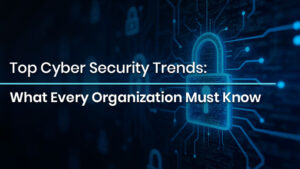
Top Cyber Security Trends: What Every Organization Must Know
Top Cyber Security Trends: What Every Organization Must Know Introduction In an era marked by digital transformation, remote workforces, and rapidly evolving threat landscapes,
Limited-Time Offer! Get an exclusive 40% OFF on IPSpecialist Premium Monthly & Annual Plans. Use Promo Code: UPSKILLNOW at checkout.

Top Cyber Security Trends: What Every Organization Must Know Introduction In an era marked by digital transformation, remote workforces, and rapidly evolving threat landscapes,

Zero Trust vs. SASE: Everything You Need to Know Introduction As the cyber world continues to change, companies need to look beyond conventional security

Cloud Security Posture Management (CSPM) Introduction In the era of digital transformation, organizations are moving to the cloud at an unprecedented pace. While the
Table of Contents
In today’s rapidly evolving digital landscape, the need for robust cybersecurity measures is more critical than ever. Organizations are increasingly turning to advanced solutions to safeguard their assets and maintain operational integrity. Two pivotal technologies in this realm are Security Information and Event Management (SIEM) and Security Orchestration, Automation, and Response (SOAR). While both play crucial roles in enhancing cybersecurity, understanding their differences and complementary functions can help organizations achieve a more resilient security posture.
To elevate your cybersecurity posture and navigate the complexities of SIEM and SOAR technologies, visit IPSpecialist.net. Explore our comprehensive training programs and expert-led Courses designed to empower your team with the knowledge and skills needed for effective security management. Don’t let cybersecurity challenges hinder your success—empower your organization with IPSpecialist’s cutting-edge solutions and expertise.
SIEM solutions are designed to aggregate, analyze, and manage security data from across an organization’s IT environment. By centralizing logs and event data from various sources—such as network devices, servers, and applications—SIEM systems provide a comprehensive view of the security landscape. Key features of SIEM include:
SOAR platforms enhance an organization’s ability to respond to security incidents by automating and orchestrating response actions. While SIEM provides the data and context, SOAR solutions streamline the response process through automation and integration. Key features of SOAR include:
| Feature | SIEM | SOAR |
| Primary Function | Data collection, analysis, and correlation | Automation, orchestration, and response |
| Output | Alerts and reports | Automated actions and case management |
| Focus | Detection and investigation | Response and remediation |
| Typical Use Cases | Log management, threat hunting, compliance | Incident response, automation, case management |
| Key Components | Log collectors, data processors, correlation engines, reporting tools | Playbooks, automation engines, case management modules, threat intelligence integration |
| Technology Stack | Big data technologies, machine learning, data visualization | Workflow engines, integration platforms, automation tools, threat intelligence platforms |
| Deployment Models | On-premises, cloud-based, hybrid | On-premises, cloud-based, hybrid |
| Integration Capabilities | Integrates with various security tools (firewalls, IDS/IPS, endpoint protection, etc.) | Integrates with SIEM, ticketing systems, IT service management tools, threat intelligence platforms |
| Skillset Requirements | Security analysts, data analysts, engineers | Security analysts, automation experts, developers, incident responders |
While SIEM and SOAR serve distinct functions, they are highly complementary and can be integrated to provide a more robust cybersecurity strategy:
When evaluating SIEM and SOAR solutions, organizations should consider their specific needs and objectives:
In the quest for a resilient cybersecurity framework, SIEM and SOAR play pivotal roles. By understanding their unique capabilities and integrating them effectively, organizations can enhance their ability to detect, respond to, and mitigate security threats. As cyber threats continue to evolve, leveraging both SIEM and SOAR technologies will be essential for building a robust and adaptive cybersecurity strategy.
SIEM focuses on aggregating, analyzing, and managing security data from various sources to provide visibility into potential threats and compliance. SOAR, on the other hand, is designed to automate and orchestrate response actions to incidents, streamlining and accelerating the incident response process.
Yes, SIEM and SOAR can and often should be used together. SIEM provides the data and insights needed for identifying potential threats, while SOAR automates and manages the response to these threats. Integration between the two enhances overall security effectiveness by ensuring a seamless flow of information from detection to response.
IPSpecialist offers comprehensive training programs and expert-led courses on SIEM, SOAR, and other cybersecurity technologies. Our courses are designed to equip your team with the skills and knowledge needed to effectively implement and manage these technologies, enhancing your organization’s cybersecurity posture. Visit IPSpecialist.net to learn more and get started.
© 2025 All rights reserved | Privacy Policy | Terms and Conditions | Sitemap | Cookie Policy




